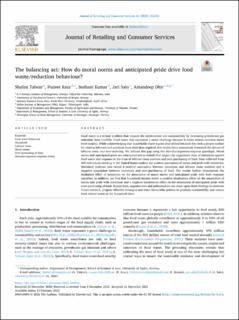| dc.contributor.author | Talwar, Shalini | |
| dc.contributor.author | Kaur, Puneet | |
| dc.contributor.author | Kumar, Sushant | |
| dc.contributor.author | Salo, Jari | |
| dc.contributor.author | Dhir, Amandeep | |
| dc.date.accessioned | 2022-06-08T07:32:23Z | |
| dc.date.available | 2022-06-08T07:32:23Z | |
| dc.date.created | 2022-05-20T09:46:03Z | |
| dc.date.issued | 2022 | |
| dc.identifier.issn | 0969-6989 | |
| dc.identifier.uri | https://hdl.handle.net/11250/2997808 | |
| dc.description.abstract | Food waste is a serious problem that impacts the environment and sustainability by increasing greenhouse gas emissions from landfills. Food waste also represents a social challenge because it raises serious concerns about food security. While acknowledging that households waste a great deal of food because they lack a proper routine for reusing leftovers and purchase more food than required, few studies have extensively examined the drivers of leftover reuse and over-ordering. We address this gap using the stimulus-organism-response paradigm. Moral norms and anticipated pride are conceptualised as stimuli that impact the organismic state of intentions against food waste and response in the form of leftover reuse routines and over-purchasing of food. Data collected from 443 individuals residing in the United States confirm the positive association of norms and pride with intentions. Statistical analyses also reveal a positive association between intentions and leftover reuse routines and a negative association between intentions and over-purchasing of food. The results further demonstrate the mediation effect of intentions on the association of moral norms and anticipated pride with both response variables; in addition, we find that household income exerts a positive moderation effect on the association of norms and pride with intentions and a negative moderation effect on the association of anticipated pride with over-purchasing of food. Researchers, organisations and policymakers can draw upon these findings to motivate future research, propose effective strategies and enact favourable policies to promote sustainability and reduce food-related waste at the household level. | en_US |
| dc.language.iso | eng | en_US |
| dc.publisher | Elsevier | en_US |
| dc.rights | Navngivelse 4.0 Internasjonal | * |
| dc.rights.uri | http://creativecommons.org/licenses/by/4.0/deed.no | * |
| dc.title | The balancing act: How do moral norms and anticipated pride drive food waste/reduction behaviour? | en_US |
| dc.type | Journal article | en_US |
| dc.type | Peer reviewed | en_US |
| dc.description.version | publishedVersion | en_US |
| dc.rights.holder | Copyright 2022 The Author(s) | en_US |
| dc.source.articlenumber | 102901 | en_US |
| cristin.ispublished | true | |
| cristin.fulltext | original | |
| cristin.qualitycode | 1 | |
| dc.identifier.doi | 10.1016/j.jretconser.2021.102901 | |
| dc.identifier.cristin | 2025874 | |
| dc.source.journal | Journal of Retailing and Consumer Services | en_US |
| dc.identifier.citation | Journal of Retailing and Consumer Services. 2022, 66, 102901. | en_US |
| dc.source.volume | 66 | en_US |

